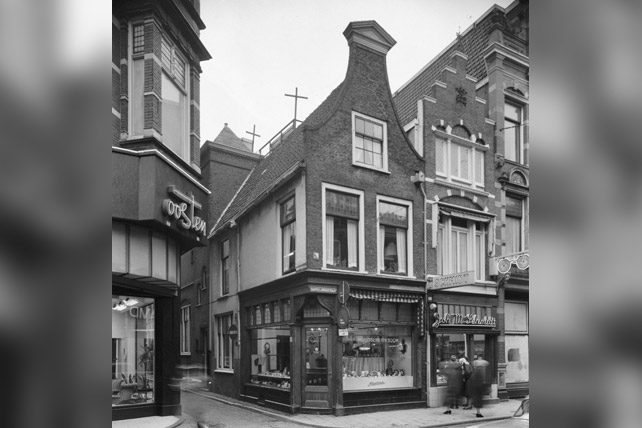In the late 1930s, Corrie ten Boom was living in a small town in the Netherlands, better known as Holland. Her home, called the Beje (pronounced bay-yay), was a tilting, centuries-old house in the center of Haarlem and its bumpy brick streets.
Actually, it was two houses. In front it looked like a typical old-Haarlem structure: three stories high, two rooms deep and one room wide. But sometime in its history, the rear wall had been knocked through to join it with the even thinner, steeper house behind it.
Horrified by the German onslaught against the Jewish people of her country, Corrie (along with her family) began to hide within their home those most threatened by arrest. It was precisely the eccentric design and construction of their house that allowed such a perfect “hiding place” to be built in Corrie’s bedroom. To this day, you can tour the home and see where so many Jewish persons were hidden, protected from capture and, most certainly, death.
The family was eventually discovered for doing this and transported deep within Germany to a place whose very name struck terror—Ravensbrück, the notorious extermination camp. Her father died within the first two weeks of his arrest. Corrie’s sister, Betsie, eventually died in Ravensbrück as well.
Corrie survived. Through the humiliation, the beatings, the deprivation, the starvation, the sickness, the stench—she survived. Corrie spent the rest of her life speaking of Christ’s love and forgiveness, mercy and sustenance, goodness and trustworthiness, wherever she went. Eventually her story was captured in the bestselling book “The Hiding Place,” one of the most life-changing biographies you will ever read. Corrie became an ambassador to the world.
I traveled to see her house in Haarlem, to see the “hiding place” and, perhaps most of all, to remember what it means to trust God.
Corrie learned to trust God early through the faith of her family. When she witnessed the death of a baby as a young girl, she realized that death could come to anyone. That night she burst into tears and sobbed to her father: “I need you! You can’t die! You can’t!”
Her father sat down on the edge of her narrow bed. “Corrie,” he began gently, “when you and I go to Amsterdam—when do I give you your ticket?”
She sniffed a few times, considering his words.
“Why, just before we get on the train.”
“Exactly. And our wise Father in heaven knows when we’re going to need things, too. Don’t run out ahead of him, Corrie. When the time comes that some of us will have to die, you will look into your heart and find the strength you need—just in time.”
Trusting in God is an interesting thing. It involves a “letting go.”
If I trust you with something, it means I give it to you. It passes from my hand to yours. It is no longer in my possession. If I have confidence in your character and abilities, there is a relief at the passing. I no longer worry or concern myself with the matter. It is, as they say, “in good hands.” This means that trust is very much about the person being trusted. It also means acceptance. If I trust you, then I accept what you say and what you do.
We are called to trust God in the same way, including the ultimate area of trust: his will.
The primary will of God for your life is the same as it is for everybody else—to know and to love him. When someone asked Jesus what the heart of life was all about, what the ultimate law to follow was, this is what he said: “‘You must love the Lord your God with all your heart, all your soul, and all your mind.’ This is the first and greatest commandment” (Matthew 22:37-38, NIV). We came into that love relationship through our acceptance of Christ’s work on the cross.

